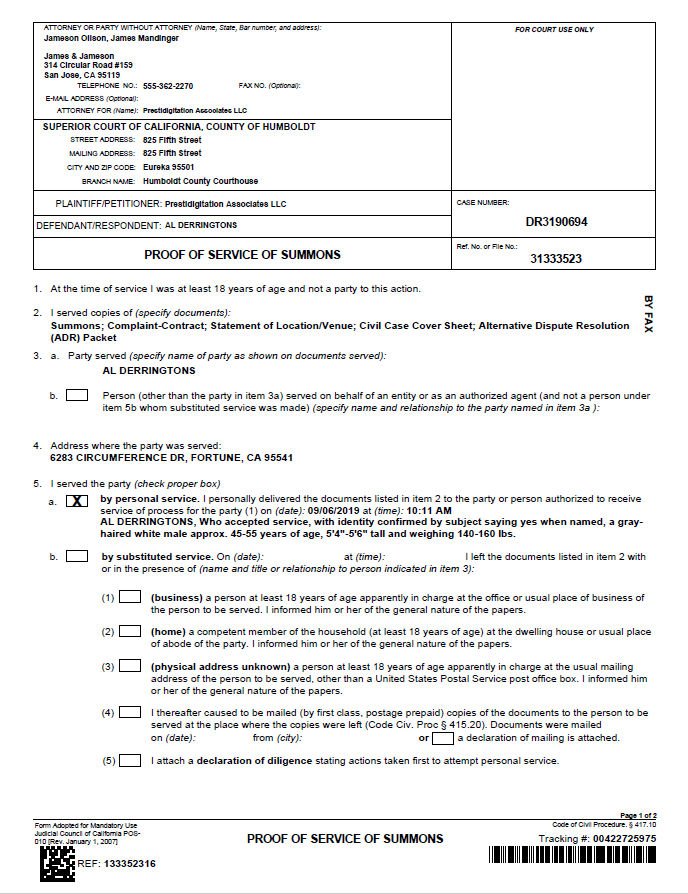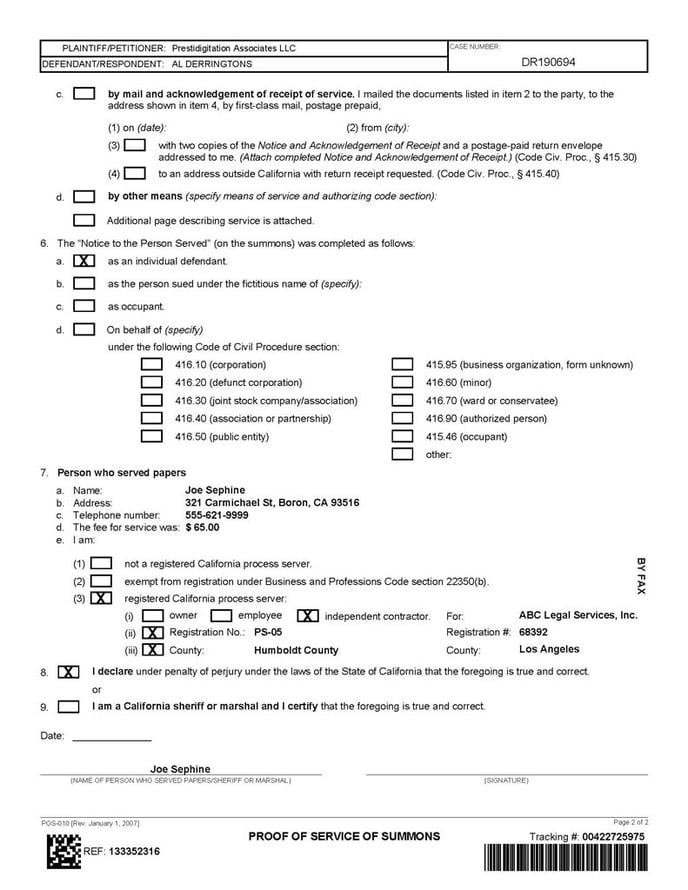California - General
Policies and Procedures
The following information is intended to serve as a general guideline. The information presented has been retrieved from the California Association of Legal Support Professionals and the Judicial Branch of California. For further information on the matter please refer to California Business and Professions Code §22350 and §22353.
Process Server Registration Requirements
-
Must be at least 18 years or older
-
Individuals must file and maintain a statewide certificate of registration with the clerk/recorder of the county in which he or she resides.
-
Individuals must be residents of the State of California for one (1) year
-
No classes or training is required
-
Every applicant is required to post a $2,000 bond or cash deposit
-
Licensed private investigators are exempt, but still may want to register to be able to do all types of process serving
-
Registrants apply at the county level, but the registration is effective statewide for two years, and then must be renewed
|
To Become a Registered Process Server in California you will need the following: |
|---|
|
1- Complete a Registration Form (Obtained from the County Clerk or Recorder’s office) To find yours please visit: https://www.cdph.ca.gov/Programs/CHSI/pages/county-registrars-and-recorders.aspx |
|
2- Get Fingerprinted (There are two forms of fingerprints. Check with the Clerk/Recorder in your County to verify which method is acceptable.) |
|
3- Obtain a Bond (You must contact an insurance or surety company in order to obtain a bond. The bond must be valid for the two-year term of the registration) |
|
4- Photographs (two passport photos (2” x 2”) |
|
5- Pay Fees |
Once all 5 steps have been completed you will need to appear and deliver all the documents to the county clerk.
For more information on how to become a Process Server in California please refer to the following link
California Substitute Service Rules
-
-
Always be sure to review the service requirements of the order as some of the following rules may vary depending on the court
-
At least 3 attempts must be made on different days and at different times of the day (AM, PM, Weekend attempt)
-
On the last attempt a server can leave the documents with someone, at least 18 years of age who is also a resident of the home, after the server has confirmed that the defendant resides or receives mail at the address. (Please be sure to report this in your attempt log via ABC Mobile)
-
If attempting to serve documents at a business, a server can leave the documents with someone at least 18 years of age who has the capacity to accept the documents
-
Servers must tell the person they're giving the documents to that the documents are legal documents and who the papers are for
-
Servers must take note of the name of the person they have given the court papers to. If the person refuses to give their name, the server must be sure to write down a detailed physical description of the individual
-
Service by Posting and Mailing (for Eviction Cases Only)
-
Service by posting and mailing is used after several attempts to personally serve the documents have been attempted and failed, at least 3 or more times.
-
If the court grants permission to serve by posting and mailing, the server must:
-
-
Post the documents on the premises where the (tenant) defendant is most likely to see it. Please refer to Posting Documents for a guide on how papers should be affixed to the premises.
-
⚠️ Unless a Support Specialist specifically requests otherwise, you are not responsible for mailing the documents—ABC will handle this on your behalf.
If you receive conflicting information from a special handling note, please contact Process Server Support to confirm if mailing needs to be done, prior to completing the mailing yourself.
Service to a Private Mailbox Facility
Substitute service is allowed on the first attempt at a private mailbox facility. Private mailbox facilities include UPS and Fed-Ex facilities, as well as smaller privately owned businesses.
Before service, it must be verified that the person to be served is a box-holder at the location.
USPS locations are NOT private mailbox facilities, and thus service is strictly disallowed. Do not attempt service at a United States Postal Service location. Please log the attempt via ABC Mobile and report the address is a PO BOX.
Serving Businesses
When serving businesses, always try to find the registered agent if one is listed, even if the address you arrive at does not match the name of the business being served. Always be sure to confirm the defendant is employed at the location, follow diligence and be sure to report any relevant information when logging the attempt or service via ABC Mobile.
If you arrive at a:
Residence: Ask for the registered agent anyway, as this may be their home address.
Law firm: Ask for the registered agent, or for the registered agent of the named business. You can be clear about why you are there. This is likely where the registered agent of the business works.
Business: Ask for the registered agent, even if the name of the business does not match the documents.
Corporation: You may serve any employee of the company who clarifies they are authorized to accept, though the higher up in the company the individual served the better. You'll know you are serving a corporation if there are initials after the name, such as INC, LLC, APC, etc. or the name will specifically 'Corporation'.
California Proof of Service Example:



